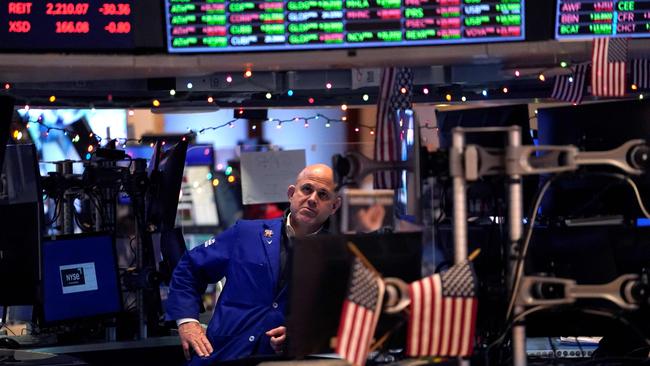Australian share investors on Wall Street beat all rivals with powerful returns
The most popular offshore stocks held by Australians just happen to be the big winners of the year, but analysts warn those looking overseas to tread carefully amid looming headwinds.

Australian investors in overseas shares have done well this year, but the mid-year outlook message from the largest investors globally is to tread cautiously – the threat of a possible US recession on company earnings being the main worry.
For example, BlackRock – the world’s largest fund manager – warned clients this week that worker shortages and other supply constraints were forcing central banks to keep higher rates for longer in their effort to curb inflation.
“This is not a friendly backdrop for broad asset class returns, marking a break from the four decades of steady growth and inflation known as the Great Moderation,” a note to BlackRock clients suggested.
To find opportunities, the manager with about $US9 trillion ($13.6 trillion) in funds under management said it was getting “granular” to harness “mega forces”, looking for the winners from “structural shifts” such as the rise of artificial intelligence to help drive returns.
Its “granular” comments are neatly reflected by the performance of the US market – the go-to market for 90 per cent of Australians that invest in direct international shares – this financial year.
Even as the US Federal Reserve pushed benchmark interest rates to 5-5.25 per cent by May, the highest since 2007, from near zero rates in just over a year, the S&P 500 total return index in the US is on track to post returns of about 17 per cent this year.
Close to a third of that performance has been driven by eight mega stocks that have benefited from the hype around the potential of artificial intelligence.
Happily, and perhaps not surprisingly, some of those companies driving the returns this year are among the most frequently bought international shares by Australian investors, booking them a healthy return.
For example, the shares of the main index contributor, Apple, are up 36.7 per cent since the end of last financial year, while shares in chipmaker Nvidia have almost trebled in price over the same period to contribute 13.5 percentage points to the index, according to Bloomberg data.
Facebook’s parent company, Meta, contributed 5.78 percentage points to the index performance with its impressive 74 per cent gains.
While the most efficient way to invest offshore is through managed funds and ETFs, many also do so directly.
“When they do, the vast majority – probably over 90 per cent – are buying US stocks,” says nabtrade director of investor behaviour Gemma Dale.
“The Australian share investors in the US market tend to build buy-and-hold portfolios with really familiar brands,” she says.
Tesla is the most traded stock, according to top brokers CommSec and nabtrade. The stock has more than doubled this calendar year and is on track to close the financial year 12 per cent higher.
“The Elon Musk factor has been a big part of the driver for quite a long time,” Dale says.
“It’s been very appealing to have a toe in the water – a little piece of the future. That is something a lot of investors get excited about.”
After Tesla, Alphabet (Google), Nvidia, Apple, Microsoft and data analytics company Palantir Technologies are the most traded stocks through CommSec, the nation’s largest broker.
“Our investors are heavily overweight the stuff that has been performing really, really strongly over this year,” Dale says. “They have been absolutely in the right place at the right time. And they’ve been in those sectors for quite a long time.”
Dale says that, outside of the tech stocks, Warren Buffett’s Berkshire Hathaway is another much-loved stock of Australian investors. It is the 18th-most traded stock through CommSec. Berkshire’s B shares are up about 22 per cent in the past 12 months.
But the outlook is a different matter altogether, with several economists and investment specialists warning a recession could be near, including JPMorgan Asset Management, which earlier this month told clients it still believed “a recession is more likely than not”.
“Elevated valuations now make it more difficult for us to argue that markets are appropriately priced for the slowdown we still see ahead,” it said, suggesting investors position their portfolios defensively on high-quality names and consider adding exposures to alternative asset classes, such as infrastructure.
CommSec senior economist Ryan Felsman says that, even as markets are grinding higher, “recession risks and the potential for earnings downgrades remain the two near-term challenges for US equity markets”.
Brett Puff, New York-based equity portfolio manager at American Century, agrees. He manages the fund’s $US30bn global growth strategy and puts it this way: “It feels like we’re slow-walking into a recession, we’re slow-walking into a period of time when growth is going to continue to lose altitude.
“The reason our team is concerned about the future path of growth is that we’ve had a lot of tightening over a short period of time and in our opinion the headwind, the impact on the real economy is only really starting to play out today.”
Puff says he believes that, while rates will stay higher for longer, there will be pockets of growth, and says AI will bring “long-duration opportunities”.




To join the conversation, please log in. Don't have an account? Register
Join the conversation, you are commenting as Logout